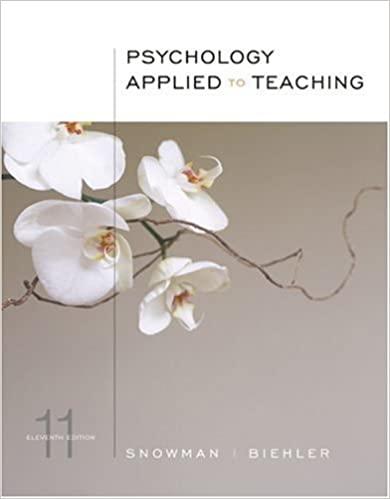Question
Question 12 (b) scenario 1 : tension -> you are working in the 4 - 5 year old room when you notice some children playing
Question 12 (b) scenario 1 : tension -> you are working in the 4 - 5 year old room when you notice some children playing with the building block become frustrated with each other. One child ( 5 year old ) tightens their fist around a block . they make a loud noise with their voice " Ahhh " and they tense up. They look as though they are going to either throw the block or hit another child with the block. Outline the support you would provide to help the child understand their physiological response ( tension ) and to take ownership and responsibility for their own actions. Ensure you response is developmentally appropriate. scenario 3 : increased heart rate an shortness of breath > ( talk on stranger danger ) the 3 - 4 year old room is having a visit from the police to talk with the children about being safe and knowing when you are in danger. One of the children ( 4 years old ) asks you why their chest bumps and they can't breathe properly when they get scared. Explain how you would respond to the child to help them to understand their physiological response ( increased heart rate and shortness of breath ) Question 13 > identify the two required national quality area (s) and all related standards that you would consider to ensure you create safe experience for play. Question 14 > Research and discuss the importance of brain development in early childhood and the impact of this their future learning success. Question 15 > Research Vigotsky's theory of cognitive development and answer the following questions. (a) explain the importance of children engaging in imaginative play as identified by Vigotsky's (b) provide two examples of how educator's can support children's imaginative play in the early childhood sector. Question 16 > research child development theories related to creativity. (a) identify at least two theories which refer to refer to creativity in early childhood. (b) outline why it is important for creative play to be supported in the early childhood sector and how this relates to developmental theories. Explain how you can support this type of play in practice. Question 17 > research theories related to play and list the stages of play identified in at least one theory. (b) describe how educator's could apply the knowledge of the stages of play to their practice in the early childhood sector when supporting children to play. Provide at least two examples. Question 5 > based on your experience either at early learning centre or during your placement. how can you ensure. (a) all educator's can effectively observe children in line with the centre's expectations and observation tools? (b) everyone understands safety requirements around learning and play? Question 6 > based on your critical reflections and the conversations you had with your trainer and assessor at early learning centre. Training what skills do you plan to develop? Set two goals based on skill development. for example, you use a SMART - goal specific measurable achievable realistic time - based = SMART ACTION PLAN > Specific what are you trying to achieve? Measurable how will you know when you have achieved it ? Achievable how can the goal be achieved? Realistic is it possible to achieve it? Time - based when can I achieve this goal? Question 7 -> the service philosophy states, " We believe children are individuals who learn and develop at their own rate. Building on their strengths, children gain a sense of achievement in themselves. We foster in children a strong sense of wellbeing through emergent programs, intentional teaching experiences and spontaneous learning opportunities. this is achieved in a flexible, inclusive, and safe environment. facilitated by a team of committed staff who focus on providing learning within a nurturing, supportive, secure and loving environment. We cater for the individual children's age and stage, and provide a positive environment active learning and development through play " explain to the new educator's what play - based pedagogy is and why it is valued so highly within the early learning centre philosophy. Question 8 > Reflect on your interactions with children, patents, and staff either at early learning centre or during placement. Provide three examples of practice that support the implementation of the approved framework in the service. For this purpose, read through the early years learning framework for Australia V2.0, 2022 ( page 10 ) . Children parents staff . Question 9 > Based on two learning experiences set up either at early learning centre or during your work placement, use reflection to evaluate the document these play experiences in regards to development areas reflected and to the link EYLF learning outcome. then you will be discussing the reflection process and outcome with your trainer who is going to make comments about your performance through a checklist found at the end of this question. LEARNING EXPERIENCE 1 you can describe it ? developmental are reflected link to the EYLF learning outcomes. LEARNING EXPERIENCE 2 you can describe it? developmental are reflected - link to the EYLF learning outcomes. ( Course certificate III in early childhood education and care )
Step by Step Solution
There are 3 Steps involved in it
Step: 1

Get Instant Access to Expert-Tailored Solutions
See step-by-step solutions with expert insights and AI powered tools for academic success
Step: 2

Step: 3

Ace Your Homework with AI
Get the answers you need in no time with our AI-driven, step-by-step assistance
Get Started


